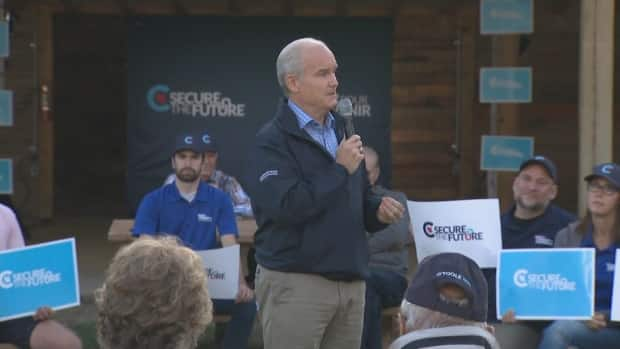Conservatives might not sweep all seats in Sask., political watchers say

The Conservative Party of Canada swept all 14 of Saskatchewan's seats in the 2019 federal election, but political watchers say there are some ridings that could flip on Sept. 20 with enough momentum from the NDP or the Liberals.
That could potentially be "problematic" for the Conservative Party's hopes of forming government, says one expert.
Regina-Wascana, Regina-Lewvan, Saskatoon West and Desnethé-Missinippi-Churchill River are the ridings that look too close to call in right now, according to a pollster and a political science professor at the University of Saskatchewan.
Three of those ridings had the province's closest races in 2019:
In Saskatoon West, Conservative Brad Redekopp won 48 per cent of the vote, defeating NDP incumbent Sherri Benson, who got 40 per cent, by just under 2,900 votes.
In Desnethé-Missinippi-Churchill River, Conservative Gary Vidal took 42 per cent of the vote, beating NDP incumbent Georgina Jolibois (28 per cent) and Liberal candidate Tammy Cook-Searson (26 per cent).
In Regina-Wascana, Conservative Michael Kram took 49 per cent of the vote, winning by a more than 7,000-vote margin over veteran Liberal MP Ralph Goodale, who had 34 per cent.
But this year, "if they have any aspirations of forming government," the Conservatives can't drop multiple seats in Saskatchewan, says Mainstreet Research vice-president Joseph Angolano.
"It just can't happen," the pollster said. "Losing one seat's bad, losing two seats is really bad. Losing three seats should be considered very problematic."
Charles Smith, an associate professor in the political science department at the University of Saskatchewan, singled out the four ridings he says have the potential to turn Liberal red or NDP orange because of the well-known candidates running in them.
Tria Donaldson, a racial equality and labour activist, is running in Regina–Lewvan for the NDP. Robert Doucette, who was the president of the Métis Nation-Saskatchewan, is running for the party in Saskatoon West.
Smith says Regina-Wascana is a competitive riding since it was the Liberals' lone Saskatchewan stronghold before 2019, represented by Goodale from 1993 until Kram defeated him. Sean McEachern is now the Liberal candidate for the riding.
Meanwhile, having Buckley Belanger — Saskatchewan's longest-serving MLA — running in Desnethé-Missinippi-Churchill River for the Liberals could boost the party's chances there, according to Smith.
Éric Grenier, CBC's polls analyst and the creator of thewrit.ca, agrees that the Liberals might be able to win in Desnethé-Missinippi-Churchill River, though he says it will be tough for the party to win Regina-Wascana without Goodale on the ballot.
Grenier, who compiles CBC's Poll Tracker, said in mid-August there was "potential that at the end of the election, Saskatchewan could be the most Conservative province in the country."
WATCH| Saskatchewan's tight races to watch in the upcoming federal election:
This week, he said that's still possible, if the NDP doesn't garner enough traction in Saskatoon and Regina.
Daniel Westlake, an assistant professor of political studies at the U of S, says the Conservatives could struggle in Saskatoon and Regina ridings because they're more urban, as well as in Desnethé-Missinippi-Churchill River, partly due to the larger Indigenous population that is less likely to support the party.
Move to centre could cost votes
Another reason that the Conservatives might not win all of Saskatchewan's seats is because of the provincial Saskatchewan Party government's response to the pandemic, according to Smith.
"The disgruntled majority in the provinces in Alberta and Saskatchewan who are angry at their provincial governments could take it out on the Conservatives nationally," Smith said.
The People's Party of Canada's growing support could also play a role on election day, according to Westlake.
CBC's Poll Tracker earlier this week suggested the PPC could have the fourth-highest share of the vote on Sept. 20.
WATCH | Conservative Leader Erin O'Toole asked about rising People's Party support:
"The Conservative Party has had to shift towards the centre in order to compete with the Liberals for swing voters," Westlake said.
"That makes them more vulnerable on the right flank. And so it's not unexpected in that kind of situation that some more right-leaning Conservatives would shift over to the People's Party."
There have been PPC signs at several protests across the country, including outside hospitals and at Liberal Leader Justin Trudeau's events.
"Some of those voters might say, even if it's strategically not advantageous, they might stick with the PPC if they feel the Conservative Party's moved too far to the centre," Westlake said.

